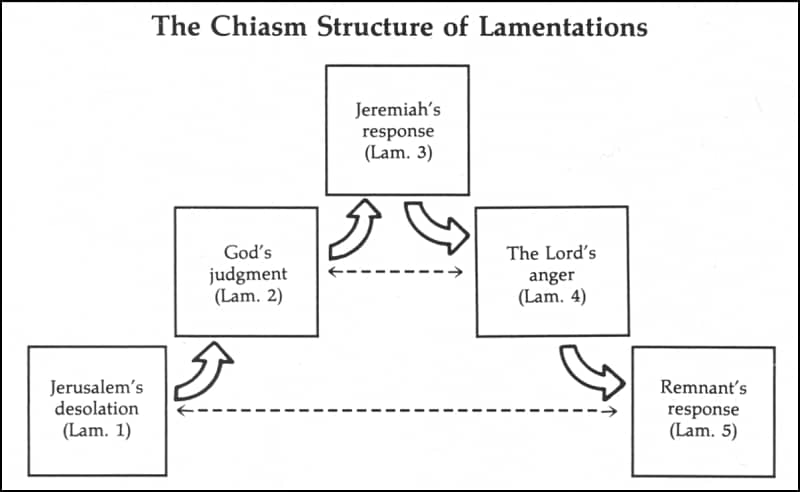Name
The title of Lamentations comes from the first Hebrew word of the book, ʾêk̠âh, which means “Alas!” or “How!” which is characteristically the start of a lament. The Jewish Talmud title for the book is qnôt̠, which means “dirges” or “laments.”
Author
Jeremiah is the generally accepted author of Lamentations. The Greek Septuagint, the Latin Vulgate, and the Jewish Talmud each ascribe Lamentations to Jeremiah.
Genre
Prophecy
Literary Form
Poetry
The poetic form of Lamentations is so artistic that it deserves additional discussion.
- The five chapters form a chiastic structure: Lamentations 1 – Jerusalem’s Destruction, Lamentations 2 – God’s Judgment, Lamentations 3 – Jeremiah’s Response, Lamentations 4 – The Lord’s Anger, Lamentations 5 – The Remnant’s Response. Lamentations 1 & 5 focus on the people, while Lamentations 2 & 4 focus on the Lord. Lamentations 3 becomes the center or pivot point of the book. The chiastic structure of Lamentations is more apparent in the graphic below from The Bible Knowledge Commentary.
- Lamentations 1, 2, and 4 are written as an acrostic. Each chapter has 22 verses (22 letters in the Hebrew alphabet), and each verse begins with the subsequent letter of the Hebrew alphabet. For example, Lamentations 1:1 begins with ʾalep, 1:2 begins with bet, and so on. The same acrostic pattern is seen in Lamentations 2 and 4.
- Lamentations 3 is also written as an acrostic but has 66 verses (three verses per letter of the Hebrew alphabet).
- Lamentations 5 is not written as an acrostic but has 22 verses.
Time Frame
Assuming Jeremiah as the author, Lamentations would have had to have been written in the short time frame between the fall of Jerusalem and the exile of the people to Babylon. So a date of between late 586 b.c. or early 585 B.C. is most likely.
Emphasis
The emphasis on Lamentations is on the covenant promise of God. God had promised to care for his people and prosper them (Leviticus 26, Deuteronomy 28-30), but this covenant was conditional, the people must obey God. If they did not, God would punish them until they repented and returned to Him. Lamentations records the judgment of the Lord on the people who disobeyed and rejected God just as predicted in Leviticus and Deuteronomy.
Outline
- The Devastation of Jerusalem (1:1-1:22)
- The Lord’s Wrath (2:1-2:22)
- The Judgement and Compassion of God (3:1-3:66)
- The Lord’s Anger over Sin (4:1-22)
- The Remnant’s Prayerful Response (5:1-5:22)



